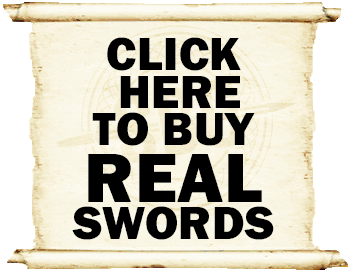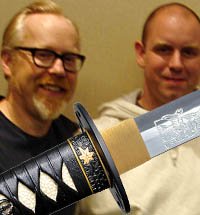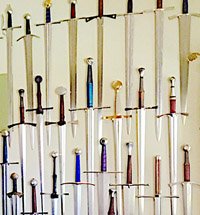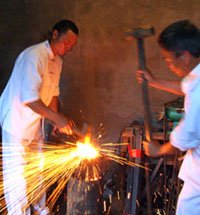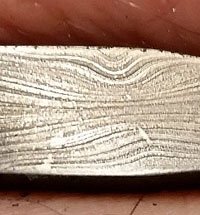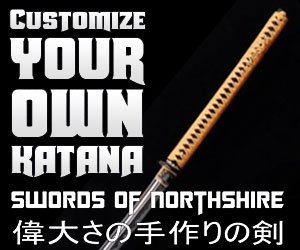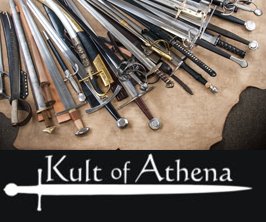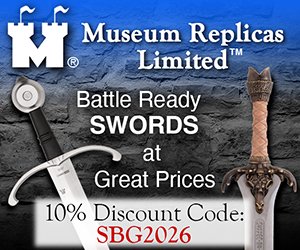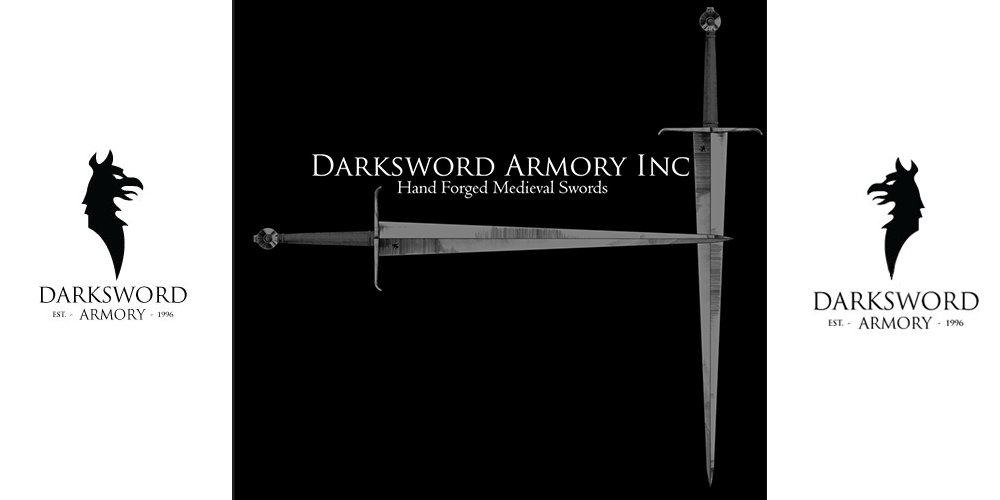Recent Articles
-
Christmas Sword Buying Guide 2025
Dec 03, 25 10:53 PM
Hank Reinhardts Final Interview
Hank Reinhardts final interview was conduced in 2007 only a few short months before his untimely death following complications following heart surgery.
Q & A with Hank Reinhardt, by Paul Southren
Welcome to SBG Hank, it is a real honor to be conducting this interview with you.
Naturally, you have already done quite a few interviews that have been published on the internet, so I am going to TRY and avoid rehashing anything that has already been covered there.
So with this in mind, let’s get started...
QUESTION 1. Every sword enthusiast has their own personal reasons for sword collecting. What are yours? In other words, what is it about swords that holds such a powerful attraction for you personally?
HANKS ANSWER: Actually this is a rather hard question to answer. I was fascinated early on by King Arthur and by the time I was in the second grade had already read all that I could get my hands on. But became quite interested in all forms of hand to hand combat, and played with most of them.
Then I discovered that there were a few real swords out there, although quite beyond my price range, that became my primary area of interest.
The interest quickly spread to all other weapons, axes, clubs, pole arms, spears land of all times and ages. About the only ones I did not get interested in was the Javanese Kris. (Obviously hand guns and shooting was included, but not to the degree of edged weapons.)
I think the main fascination is that it is so very personal. As I have grown older and have learned more about weapons and warfare I've realized this is not quite true, but the fascination still holds. At 73 I don't do very well when I go out and spar with some of my friends, and I guess I'll have to give it up in a couple of years. But we'll see.
QUESTION 2: Has there been a particular sword in your collection that you would designate as your favorite?
HANKS ANSWER: It appears that all of these questions are going to be hard to answer.
I have to break down the swords into what they are intended for before choosing a favorite. I have a Raven blade that I designed that is vaguely like a Cossack sword, that I dearly love. It cuts and stabs beautifully, making strong cuts, yet is rather light. There are two katanas that I got from Last Legend that I delight in, there are two Viking style blades that I feel are perfect for use with a shield, while I also have two rapiers that are quite deadly. Light, fast, and easy to handle. But I also have a hewing spear that I would take over all of them if the battle ground was open enough.
You need to remember the one thing about most swords is that they can travel with you all the time, whereas axes, spears and pole arms can quite easily get in the way.
QUESTION 3: A hypothetical: in this modern era, there is little doubt that the gun is the best weapon of self defense. But in the absence of a gun, which sword would you say would be the most practical and versatile (i.e. indoor/outdoor) choice in a modern day setting – against an unarmored opponent armed with a contemporary hand weapon such as a baton, baseball bat or crowbar? And what would be the best way to use it?
HANKS ANSWER: Since you have taken away my AK47,CAR 15 and ,45 and left me with only a sword, I would have to take a medium sized weapon about 20-21 inch blade, slightly curved, with more of a point than a machete, and most assuredly heavier. Then you have to assess the weapon you're going up against..
Remember that mass weapons are effective only at certain ranges.
You can close and smother the blow or withdraw and make it miss. This weapon is also a very effective tool. As to the most effective way to use it, that would depend on the circumstances and location of the encounter. However one of the most effective tactics in warfare where large bodies of men or engaged or even two people is deception.
QUESTION 4: One thing that bugs me about many modern day ‘sword fighting systems’ is with too much padding or armor, the techniques they use fail to take into consideration the fear and adrenaline experienced in a real life and death sword fight. What do you think is the best ‘middle ground’ to get as close as possible to appreciating actual sword combat – without being cut to pieces or permanently injured? How would a medieval knight have trained for 'the fight of/for his life'? And what modern developments (such as padded weapons, etc) have made it easier to get the most authentic sword fighting experience?
HANKS ANSWER: The most important flaw in all of the current systems of combat is that in essence they are play, and no one has their own life at stake. This changes things more than you can imagine unless you have been in a serious fight with a serious weapon. But there is nothing that can be done about this. Cops get real uptight about dead bodies that have been brutally slashed or dismembered, and generally the refuse to except the explanation that he failed to duck or to parry. So we do the best we can.
I find fighting in full plate armor a little slily, since swords are ineffective, and the best way to win is to bash the guy really hard, and that leads to injuries. Now it does look nice on the field, but it really doesn't give you the feeling of real combat..
Eddie Floyed and myself have been working for several years on full contact fighting swords that feel and act like swords, but do not hurt with a small amount of padding. Right now both are set up as katanas, but we are working on a straight sword as well. We also have in the works some pole arms and axes and spears.
The patents have been applied for and just about accepted, and we expect to have them on the market at least by the end of the year. In addition I have spent a lot of time with some trauma surgeons, and the rules that will go along with them will reflect actual damage suffered in a real fight. These swords are not perfect, but are incredibly better than what is out there now.
They can even be weighted to the range of a real sword without adding any additional force to the blow.
QUESTION 5: In the last 5-10 years, the internet has seen an explosion of online sword sellers and manufacturers which has, it would appear, reached a near saturation point. With this in mind, what do you think the future of the industry holds? And on a related note, what direction would you like to see it take?
HANKS FINAL ANSWER: It is very hard to predict the way the market is going to go. One of the biggest drawbacks is the actual lack of knowledge regarding real swords. Fantasy novels and movies give a very unrealistic picture of swords, and regretfully a lot of new buyers actually believe this nonsense and can be turned off. China, India, the Philippines, Taiwan, and Pakistan have all entered the market, and while some produce very good swords, some produce junk.
Modern custom makers simply are too expensive for the basic market, and this cuts down on the blades that are actually produced here. Del Tin, who at one time produced a very good sword, seems to have abandoned the US in favor of the re-enactment market in Europe. I'm sure the economy was the reason, as the re-enactment blades are heavier with thicker edges for safeties sake, and thus require less work..
I expect new producers to pop up while I believe that some of the older one will simply fold up and go away. But if I could predict the future accurately, I would sure be right now. Hank


Buying Swords Online Can Be DANGEROUS!
Find the Best Swords in the:
Popular & Recommended ARTICLES
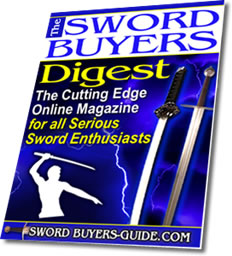
The ONLY true free online magazine for sword enthusiasts. Delivered once a month on the 1st day of the month, no filler and no BS, just the latest sword news & info delivered straight to your inbox.
